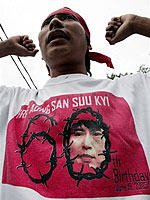




BANGKOK—Burma’s secretive military regime has released dozens of opposition activists detained in May after they called for the release of Nobel Prize laureate Aung San Suu Kyi.
Daw Tin Yi, 77, was among more than 50 people freed June 27 after being held for 42 days. She was detained by state security officers at a bus stop on Sawbyagyi hill, Rangoon, on her way to a nearby Buddhist pagoda to pray for the release of Aung San Suu Kyi, who has been detained since May 2005—initially in prison, and later at her Rangoon home.
Sources inside Burma who asked not to be named said officials last week freed 51 out of 52 opposition activists detained in May.
“On May 15, I followed the others to the pagoda for the prayers, and I was arrested near the No. 45 bus stop in Sawbyagyi hill,” Daw Tin Yi said in an interview. “I did this so that our people can be freed from their suffering.”
Local media, which are tightly controlled by the regime, reported the prayer meeting as an attempted uprising, and Daw Tin Yi said she was repeatedly interrogated about who had given her the Aung San Suu Kyi t-shirt she wore to the prayer meeting.
I will be continuing with my activities until our leader is freed, until our people are free from all these social difficulties and hardship, and until we reach the path to democracy.
“They asked my name, age, address, household head, and who gave me this t-shirt with ‘Free Aung San Suu Kyi’ written in red on a white shirt,” she told reporter Tin Aung Khine.
“I think they can’t accept the person on the t-shirt and they don’t want to see that face...The way they were questioning seemed to imply that we wore these shirts to frighten people, to provoke and to create unrest, that’s what I felt.”
Daw Tin Yi’s daughter, Daw Yu Sandar, said of her mother’s release: “I am happy and sad at the same time, because she was arrested without doing anything wrong.”
But she said she wouldn’t pressure the elderly woman to stop her protest activities.
“I can’t tell her, as she is my mother and knows the situation of Burma well and the suffering and economic hardship of people...I do not like the way we were treated because we didn’t do anything wrong. We will have to do whatever we need to do,” she said.
In an earlier interview, Daw Yu Sandar said she had herself been followed and interrogated for more than eight hours by state security officers after she and 17 family members went to the pagoda to make an offering for her mother.
“We went there for our mother,” the nun said. “Our family went to pray at the pagoda. Nobody else went with us. It was only our family—18 of us—children and adults. All of us went. When we came down from Sule Pagoda, they said, ‘Come with us for a moment,’ and they interrogated me.”
“Around 11:00, they took me to Kyaikkasan. So I cried. I cried for my parents. So they told me, ‘Don’t cry. Try to console yourself with Dharma.’ I said, ‘I can’t. I can console myself with Dharma for other things, but not for my parents.’ They took me away at 10:00 a.m. and released me only at 6:30 p.m.,” she said.
Meanwhile, Daw Tin Yi vowed to continue her political activism.
“I will be continuing with my activities until our leader is freed, until our people are free from all these social difficulties and hardship, and until we reach the path to democracy,” she said.
“You die only once, not twice. For me, I would rather die in trying to achieve what we want. I have decided to continue doing what I should do.”
Aung San Suu Kyi, who won the 1991 Nobel Prize for Peace, was most recently detained May 30, 2003, after her motorcade was ambushed by government-backed mobs in Depayin during a political tour of Burma’s northern provinces.
The junta called elections in 1990 but refused to step down when Aung San Suu Kyi's opposition National League for Democracy (NLD) won a landslide victory.
Daughter of prominent general and independence hero Aung San, who was killed in 1947, she is herself a devout Buddhist.
Original reporting in Burmese by Tin Aung Khine. Translated by Khin May Zaw. RFA Burmese service director: Nancy Shwe. Written for the Web in English by Luisetta Mudie and edited by Sarah Jackson-Han.